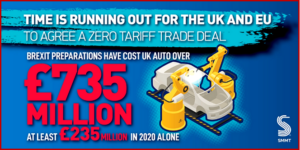The UK automotive industry has issued a last-chance plea for a zero-tariff, zero-quota trade deal as Brexit negotiations enter the endgame this week. The call comes as a new survey from the Society of Motor Manufacturers and Traders (SMMT) reveals the cost to the sector of preparing for Brexit has surpassed £735 million, with more than £235 million spent in 2020 alone. (Brexit – UK Car Production Declines -10.6%. Exports Hit, No Deal Brexit to Cost UK Auto Sector £9 Billion Per Year, Brexit Panic Takes Hold. Auto Industry Urges – Begs? – Negotiators to Avert the Business Killing Worst-Case Scenario, Brexit Automaker Winners, Losers – Predictable and Surprising, Doomsday? No-Deal Brexit Impact on UK Light Vehicle Market)
Most companies (67%) across the industry say they are doing everything in their control to prepare for new processes that will come into play on 1 January, with 70% securing GB Economic Operators Registration and Identification (EORI) numbers, 60% spending significantly on stockpiling and 52% employing customs agents, as companies also try to prepare for any disruption or delay to supply chains.
However, significant gaps in the industry’s ability to plan still exist, with a lack of clarity on the nature of the UK-EU’s future relationship hampering the efforts of almost nine out of 10 (86%) firms to prepare. A disastrous ‘no deal’ outcome, or failure to achieve workable deal for auto, would mean £47 billion hit to UK sector over next five years – on top of ongoing coronavirus crisis costs, the auto industry claims. Ah, such is the price of blind ideologies who ignore real consequences, economists and political scientists.
“As the UK-EU FTA negotiations enter the endgame, now is the time for both sides to deliver on promises to safeguard the automotive industry,” said Mike Hawes, SMMT Chief Executive. “Securing a deal is absolutely critical but it cannot be any deal. To work for UK Automotive it must deliver for UK products and that means securing the right terms and conditions that allow our exports – now and in the future – to be zero tariff and zero quota trade. A deal that failed to achieve this would be the equivalent to no deal at all, devastating jobs and slamming the brakes on the UK’s ambitions to be a world leading manufacturer and market for electrified mobility and battery technologies.”
Critical questions remain unanswered. With the industry’s competitiveness built on Just-in-Time deliveries, companies cannot afford any supply chain delays so clarity on the operation of key new customs systems such as the Goods Vehicle Movement Service (GVMS) and the Permission to Progress (P2P) process, is vital. Moreover, even if the UK and EU do conclude a Free Trade Agreement (FTA) from the end of 2020, there is uncertainty as to how companies will prove origin or products; if firms cannot do this then they will not be able to benefit from preferential trading terms.
No amount of preparation can mitigate the devastating impact of ‘no deal’, with this outcome – or even an unworkable deal – costing the UK automotive sector up to £47 billion in lost trade in cars and vans alone over the next five years.4 The industry must have a deal, and one that delivers zero tariff, zero quota trade with highly ambitious rules of origin provisions and a phase-in period that allow businesses time to adjust. Failure to achieve these requirements would, for the auto sector, be the equivalent of no deal at all, and compound the impact of the coronavirus crisis – itself already costing the UK sector some £27.5 billion in lost car production and sales.
Automotive is one of the UK’s most valuable economic assets, worth some £78.9 billion, exporting more goods than any other sector, generating billions for the economy and supporting some 180,300 often high-skilled and high-paid manufacturing jobs in communities across every nation and region of the UK – in particular those regions hit hardest by the economic impact of the pandemic. The industry delivers an annual £15.3 billion in added value every year to the UK economy, while investing £3.72 billion in R&D.



Mike Hawes, SMMT Chief Executive: “We welcome today’s agreement of a new EU-UK trading agreement, which provides a platform for our future relationship. We await the details to ensure this deal works for all automotive goods and technologies, including specifics on rules of origin and future regulatory co-operation. A phase-in period is critical to help businesses on both sides adapt and efforts should now be sustained to ensure seamless implementation, with tariff-free trade fully accessible and effective for all from day one. We will continue to work closely with government to ensure all companies are as prepared as possible in the limited time left.”